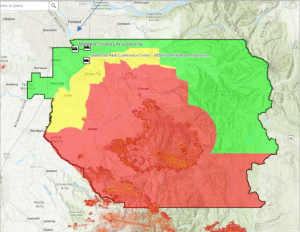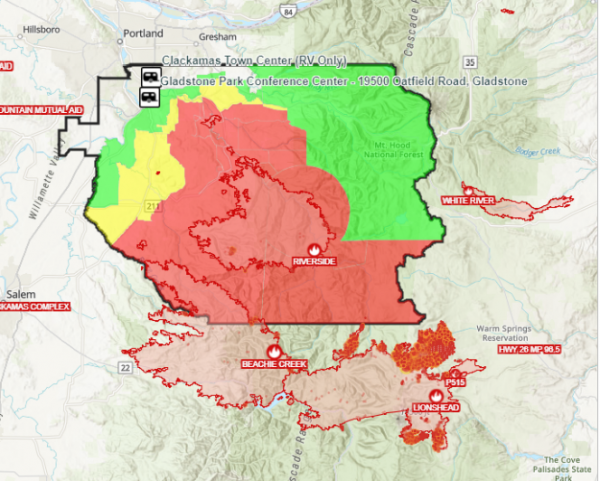
This & That ― Vignettes of a Professional Journey
A Column by Ines Bojlesen
Get Ready, Set, Go! No, it’s not a starting line for a running race, but evacuation levels for wildfires. This has been our reality on the entire West Coast of the US since early September.
This & That has shared with readers my professional experiences, things that I learned as I “matured” in my career. This post, however, will be about my personal and scariest experience. I know that as I write this, the East and Gulf Coasts are facing yet another hurricane threat, and people are probably taking many of the steps I mention here, but for a different force of nature.
Having access to the news 24/7 and from all parts of the country and the world, broadcasts of disasters are daily, whether they’re caused by fire, water, wind or people.
Wildfires are a constant concern in the Northwest and burn thousands of acres in the wooded and rural areas during summer. The fires burning now are unprecedented because they threaten small and large urban areas.
A strong windstorm hit Oregon on Monday, Sept 7 and lasted for two days, knocking down trees and power lines. With the ground being very dry, the downed lines caused small fires across the state. Three big ones started in a more populated county, Clackamas, where I live.
Wednesday night I received an alert that Lake Oswego and several neighboring cities were in Level One evacuation zone, meaning: GET READY for potential evacuation. Neighboring areas were already in SET (You must prepare to leave at a moment’s notice) or GO! (Evacuate now! Leave immediately!).
Years ago, I did a Community Emergency Response Team (CERT) training, trying to be prepared for earthquakes and other disasters. The phone call triggered my “response” mode and I started preparing.
I keep our Red Cross emergency backpacks in the entrance closet. They contain water (in bags), energy bars, first aid and other useful things. I immediately loaded them in the car to reduce the number of items to carry if evacuation was needed.
By order of importance, I prepared:
- Documents – medical histories, certificates, income tax
- Medications – the daily boxes plus the original containers
- Extra pair of glasses
- Cash – I keep an envelope with “disaster cash” containing small bills
- Laptop – charger and external backup drives
- Printed list of family/friends’ phone numbers
- Clothing for a couple of days, sturdy and comfortable shoes
- Jewelry and photos are precious, but at times of emergency they are not a priority. However, I took pictures of the pictures I have hanging or at my desk and uploaded them to my backup.
Then came planning of where to go. The safest seemed to be a big city, where there is less vegetation. I reserved a room at a hotel by the river, in Portland. With COVID-19 still a threat, shelters present added risks. But I needed plans B and C in case plan A became unfeasible. Going west, towards the coast, seemed the best route; I checked maps and roads.
On Thursday, the sky changed from orange to gray, and heavy, dense smoke covered all of Oregon. Lake Oswego went into an Emergency State, meaning no leaf blowers or powered equipment can be used, among other things. We are also asked not to use ovens, not to fry food and to conserve water.
A big relief came on Saturday, when the county announced that Lake Oswego and adjacent cities were out of an evacuation zone. Meaning that although not contained, the three big fires had not merged and grown. Now, even the hazardous air quality becomes bearable, thinking the ominous fire is not as close to us.
While planning for us, I thought of my 93-year-old neighbor who has no family nearby and does not have a car. I called her and asked what her plans were if we needed to evacuate, and with an attempt to be cheerful, she told me: “I will walk down to the street and hitchhike”. I told her she would come with us.
Thousands have lost their homes on the West Coast and thousands continue to be at risk in the path of destruction. The overwhelming feeling of fear is still present, and I am sure it will last a long while. At times like these, one realizes how impotent we are, how petty material things are and how important community awareness and involvement are.
At times like these, we remember the value of firefighters, law enforcement, first responders, dispatchers, electric crews, city planners and all of those who are responsible for our safety and security. We must be reminded of our responsibility to listen to them, to heed and learn from such traumatic experiences.
I feel fortunate our city has been spared so far. I feel humbled by the force of Nature. I feel for all who are living through similar threats or are still recovering from them. I feel that I must share these moments and thoughts with you. I hope that in doing so, I am not only recording this experience, but also fostering awareness and understanding.



Leave a Reply